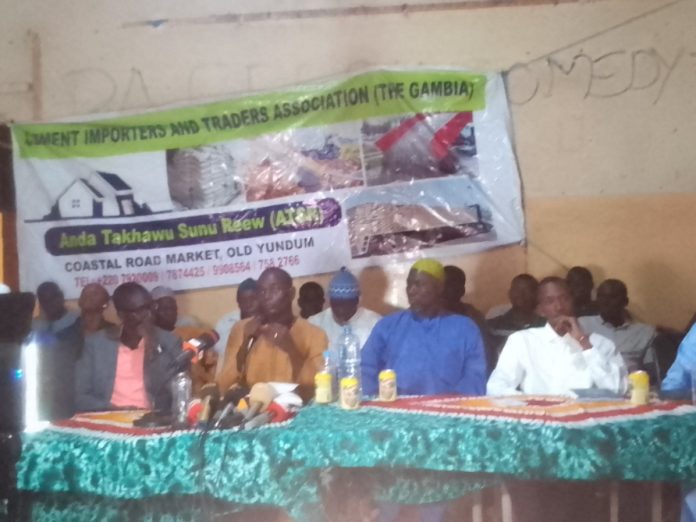By Assan Bah
Cement Importers and Traders Association (CITA) have issued a press release accusing the Gambia Police Force (GPF) of denying them permit to hold a procession.
The idea of the peaceful protest is to express dissatisfaction with the increment of the import duty from D30 to D180 for a bag of cement, they said.
The association said they were informed by the Police High Command to reschedule the day for the procession due to the upcoming Tobaski feast.
The planned date for the protest was Thursday, 13 of June. The leadership of the Cement Importers said they were called to the Police headquarters on Wednesday where the police high command informed them that they should change the date because the Tobaski feast is fast approaching. The traders said the police informed them that they would not be able to provide them with adequate security to cover the protest.
The cement traders said the police have asked them to apply again with a new date. The release indicated that it was the second time they were denied permit by the police.
The new import duty on a bag of cement was instituted by the government in April 2024, but has since been widely criticised by cement importers.
Cement importers said the increment on tariffs on the importation of cement into the country is a policy that has led to devastating effects on the people, since the cost of a bag of cement in Barra and Basse has skyrocketed to D500, while it has moved to D440 in the Kombos.
“The Trade Ministry and Jah Oil continue their misinformation campaign to justify the 500% increase to D180 on ‘bag’ cement imports, while large-scale importers like Jah Oil are allowed to import cement freely from distant European markets and Senegalese factories, from which small-scale importers are banned.
“Worse, the Jah Oil monopoly they seek to protect already ran out of cement and is now sourcing from the very factories in Senegal that small-scale importers are barred from accessing. The provinces have suffered the most as large-scale importers neglect these markets. This led to a panic within the administration, resulting in a one-time release of trucks at the border as a stopgap for the cement scarcity.”
The release further said: “To disguise their cronyism, the Trade Ministry claims that Salam encountered difficulties exporting their already imported cement into Senegal.
“They then claimed to be protecting local employment, but it was proven that small-scale importers employ four times more people than large-scale importers and pay more taxes, as they do not benefit from tax exemptions like the large-scale importers.
“They even blamed small scale importers for the rise in the CFA, which was disproven since NAWEC is the largest consumer of the CFA and the CFA continued to rise even after small-scale importers were prevented from operating.”
The release further alleged the Ministry of Trade of asserting a retaliatory trade tactic.
“The true objective is becoming clear: the ban only applies to bagged cement, while powder cement, which only large-scale importers bring in, is still allowed from Senegal and exempted from the D180 import duties,” it revealed.
The association said ‘all’ attempts to dialogue with the government have resulted in no meaningful outcome, adding: “The administration seeks to enforce a moratorium on bagged cement imports from Senegal for six weeks, while allowing powder cement and Jah Oil to continue operations with no consideration for the thousands of industry employees affected, especially during a time when they need to support their families for Tobaski.”
“Even worse, the consumer impact is disregarded as the Trade Ministry is willing to see consumers suffer from staggering price increases and cement scarcity, despite construction being the greatest contributor to our GDP and destination for foreign remittances. When asked about the consumer impact, their response is simply that consumers must sacrifice. How can this be the policy of a government for the people?” the release added.
Meanwhile, the government through the Ministry of Trade, Industry, Regional Integration, and Employment earlier this month announced the release of all cement-loaded trucks held at the Gambia – Senegal border which it said was to alleviate the stockpile at the said border.
The Ministry, however, said the action is a one-time gesture aimed solely at clearing the existing backlog.
“The existing measures for bagged cement imported from outside the Gambia will remain in force immediately after the release of the current load trucks,” the ministry said.


















